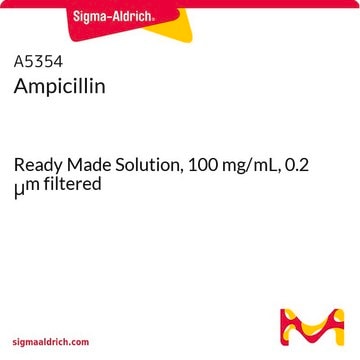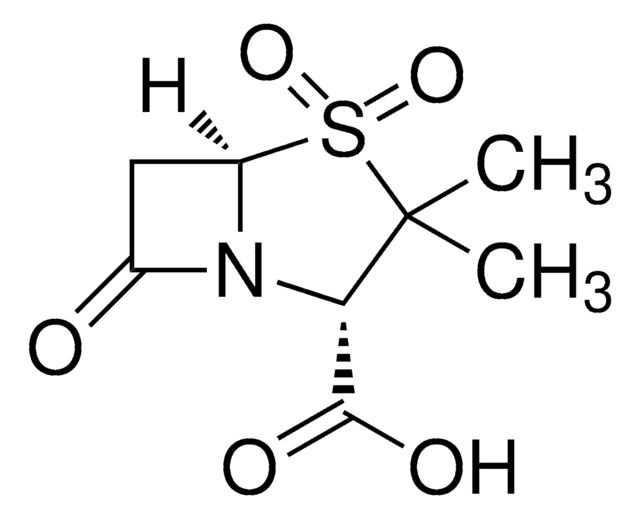1033000
USP
Ampicillin
United States Pharmacopeia (USP) Reference Standard
Synonym(s):
D-(−)-α-Aminobenzylpenicillin
About This Item
Recommended Products
grade
pharmaceutical primary standard
description
API family: ampicillin
API family
ampicillin
manufacturer/tradename
USP
mp
208 °C (dec.) (lit.)
application(s)
pharmaceutical (small molecule)
format
neat
storage temp.
2-8°C
SMILES string
[H][C@]12SC(C)(C)[C@@H](N1C(=O)[C@H]2NC(=O)[C@H](N)c3ccccc3)C(O)=O
InChI
1S/C16H19N3O4S/c1-16(2)11(15(22)23)19-13(21)10(14(19)24-16)18-12(20)9(17)8-6-4-3-5-7-8/h3-7,9-11,14H,17H2,1-2H3,(H,18,20)(H,22,23)/t9-,10-,11+,14-/m1/s1
InChI key
AVKUERGKIZMTKX-NJBDSQKTSA-N
Looking for similar products? Visit Product Comparison Guide
General description
Application
Also, for use with USP monographs such as:
- Ampicillin Sodium
- Ampicillin Capsules
- Ampicillin Tablets
- Ampicillin Boluses
- Ampicillin for Injection
- Ampicillin Soluble Powder
- Ampicillin for Oral Suspension
Biochem/physiol Actions
Mode of Resistance: Administration with ß-lactamase cleaves the ß-lactam ring of Ampicillin and inactivates it.
Antimicrobial Spectrum: Effective against both Gram-positive (similar to benzylpenicillin) and Gram-negative bacteria (similar to tetracyclines and chloramphenicol.
Caution
Preparation Note
Analysis Note
Legal Information
related product
Signal Word
Danger
Hazard Statements
Precautionary Statements
Hazard Classifications
Resp. Sens. 1 - Skin Sens. 1
Storage Class Code
11 - Combustible Solids
WGK
WGK 2
Flash Point(F)
Not applicable
Flash Point(C)
Not applicable
Choose from one of the most recent versions:
Certificates of Analysis (COA)
Sorry, we don't have COAs for this product available online at this time.
If you need assistance, please contact Customer Support.
Already Own This Product?
Find documentation for the products that you have recently purchased in the Document Library.
Customers Also Viewed
Our team of scientists has experience in all areas of research including Life Science, Material Science, Chemical Synthesis, Chromatography, Analytical and many others.
Contact Technical Service







